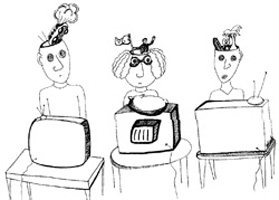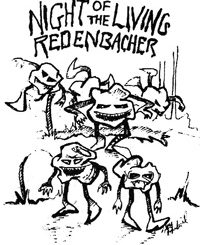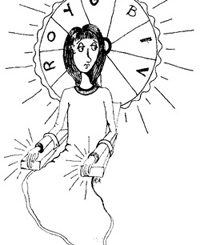 Death Race 2000
Death Race 2000
by Kerry Joyce
illustration by RAchelle
The Winter hibernation period had been even quieter than usual. No new feverish doctrine or imagined threat roused the populace from their Winter slumber, nestled as they were in their electrified nests. More wires brought more and better information, but no one, it seemed, could render anything more meaningful than it already was, in its raw, sliced and diced, edited-for-television format.
Some tried and made themselves look foolish. Generalists were naive, specialists myopic. Data was plentiful, knowledge scarce, and more elusive than ever. Flight or fight? More of this and less of that? Or the reverse? Kindness or cruelty, or what? Will the correct answer for today be the same as for tomorrow? Even the knowing were stupefied and confused. No one was in the know, and everyone knew it.
“The Emperor has no clothes,” yelled naked boys to their naked confederates, as stark naked pretenders to the throne smirked sagely. Nobody blushed.
JFK Jr. sat on a New York City sidewalk crying over a fight with his best girl. A pair of paparazzi videotaped it all for six figures. Mark Hewitt pimped off his adulterous affair with the wife of the heir to the British throne for an undisclosable astronomical sum.
It has been said that no one is a hero to his valet. It was a time when everyone enjoyed the insights of the valet, and as such, no one experienced the mountain top vistas of the hero. Those at sea level could not hope to imagine what they thought the hero saw.
Pat Buchanan stalked this country, reminding all that America was still a land of opportunity; an opportunity to be imperiled by democracy or to be perilous at the voting booth. But it was cold, and palm trees beckoned, with just a click of the remote to Baywatch.
Bomb blasts blew through the innocent in Jerusalem and London. Someone cared vitally about something somewhere. Some abstract notion of nationhood or personhood, of history or something, turned over in someone’s mind. Turned over so completely that premeditated murder became the justifiable homicide of complete strangers.
The blasters died too, sometimes deliberately, sometimes not. “My idea is bigger than your life. Or even my own.” An Irish Catholic, who could never forget the difference between Catholic and Protestant, fatally neglected the distinction between a.m. and p.m. He accidentlly set the timer on his bomb twelve hours early, blowing himself to bits.
Closer to home, ideas merely germinated in various skulls, visions more vivid than the comely, articulate, dramatized dreams on the tube. Homegrown dreams that affirmed someone’s sense of self, of aliveness, and of importance more than TV dreams, passively received, ever could. TV dreams were just that: Dreams. But dreams embossed with pride of ownership took on the luster of heightened reality.
These dreams would bring more beauty and freedom for everyone, more power for somebody good, and less for somebody bad. The stakes were high, the rewards great, the risks even greater. It was a bad bet, with long odds, but like the lottery, it did offer hope. And what else was there? Even deviance turned out to be just another niche market, another not-even-especially-eccentric form of consumerism.
The dreams would be realized, in some sense, by Spring’s end most years, or there would be destruction by summer. Matches would be lit, throats cut, bottles drained in an intoxicating mock-death. Fights would erupt, tears shed, poems written, and fingers pointed. Anger and frustration would lurk at a million red lights. Some fuses were long on hope, or something else. Some weren’t. Some, inevitably, would ignite. Most men would lead lives of quiet desperation. Many would not be so lucky. The beautiful and the ugly would clash in immortal combat, mapping out the contours of the real and the mundane of everyday life.
But not this year. This time, the beauty and ugliness neither soared nor crashed, both simply shocked and titillated, with a loving embrace.
A Madonna remained childless. A pop performer, who his made millions singing about eternal love, left his wife for somebody else. A preacher was caught with a hooker, and a celebrated free spirit turned out to be a cold and calculating control freak – it was ever thus, but this year, one topic, hypocricy (the tribute that vice pays to virtue), finally eclipsed the tributes of all, good and bad. Only those who actually were as they appeared remained invisible.
A conservative, Pat Buchanan, warned us of the dangers of unfettered corporate capitalism; a liberal, Senator Bill Bradley, extolled the wonders of the free market. The Internet provided a convenient new context for everything. Context turned out be all. Substance was nothing, because substance could always be altered with a different context. Nothing was fancifully reduced to the absurd because everything, in fact, already had been. Everything was crushed in an avalanche of bits and bytes. It was the year when the computer programmers did to the artists what the atomic physicists had done to the foot soldiers, what 19th century philosophers had done to saviors of the soul: rendered their sacrifices obsolete. It was an electronic storming of the Bastille by the pocket protector brigade.
What was once out and then in and then out again, would remain out, while that which was in, and then out, and then in again, would be out as well. Everything was out at once.
And even those who should be in, but weren’t, were demoralized by the prospect. It was bad enough when nothing good was in, but having nothing in, bad or good, was worse. Something had always been in before. It left a void. How can you be for something without something to push against?
So the Winter hibernation went on this time into Spring and Summer and even through Fall. It was called the era of the endless Winter, also known as the long sleep. Good laid down with evil, and beauty with ugliness. It was an ongoing freak show, a-pay-per-view extravaganza that everyone watched.



